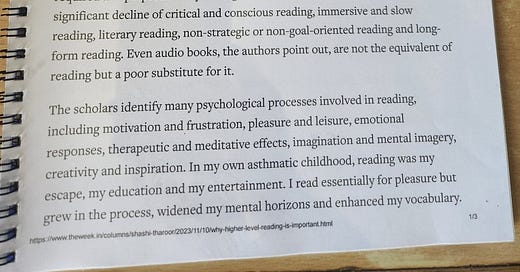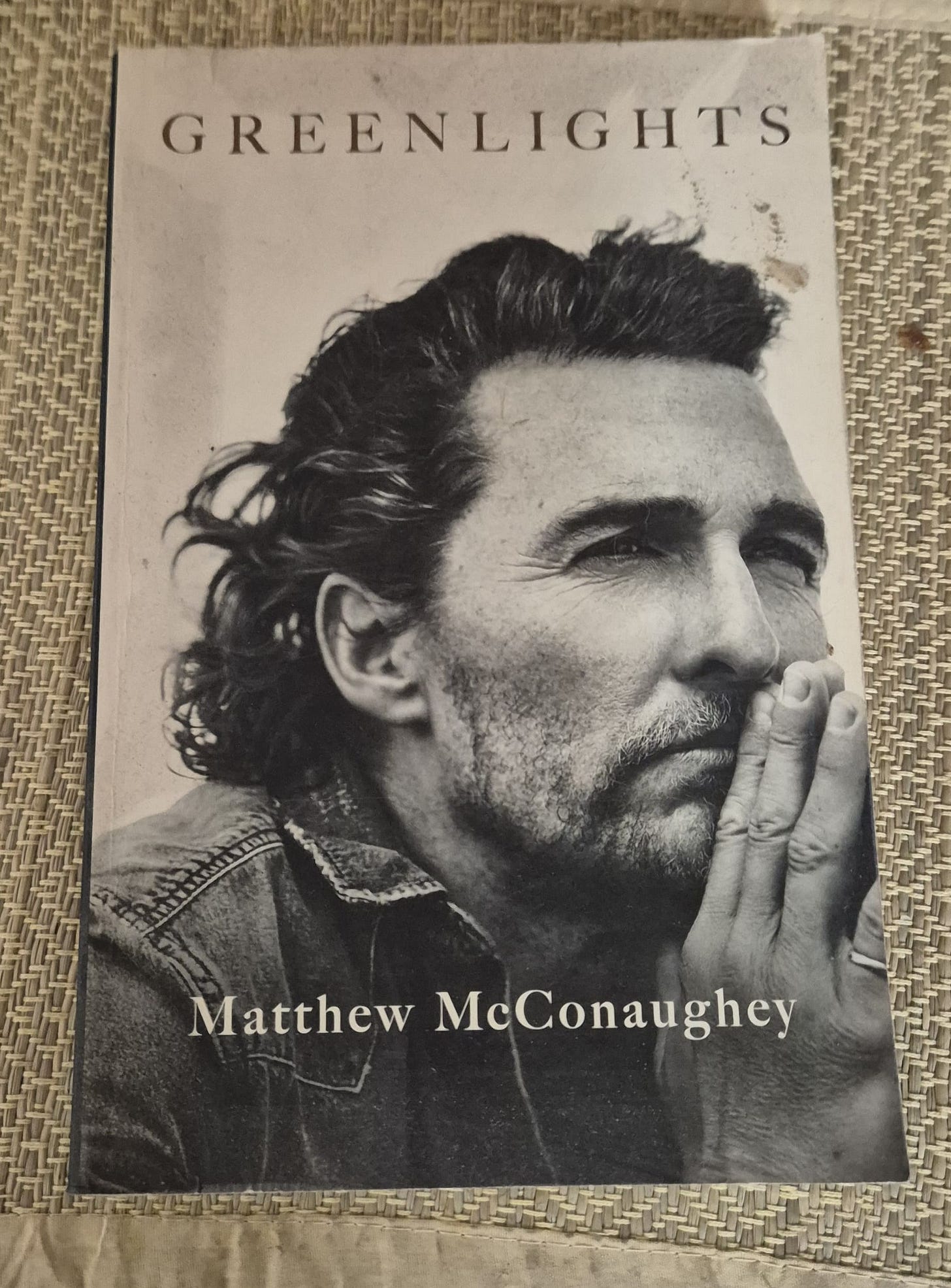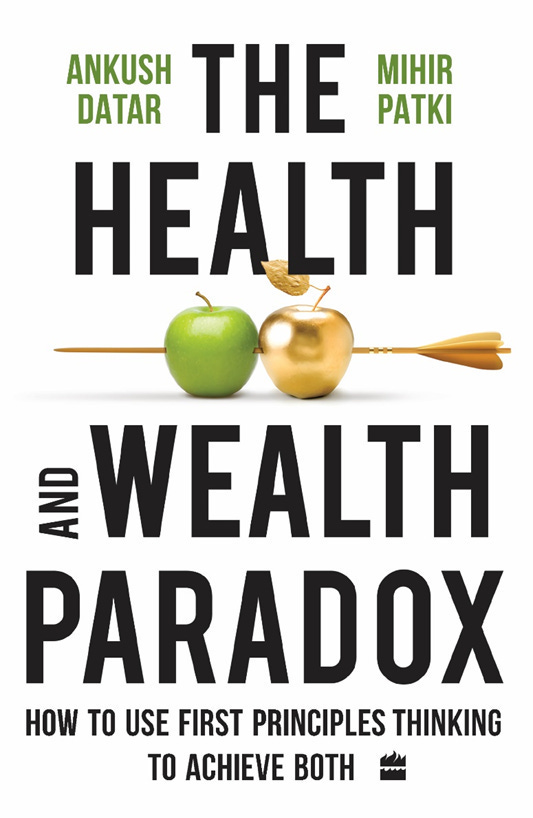If there are no young readers, there will be no old readers
'What' you read and 'Why' you read has become more important than ever today
“If there are no young readers and writers, there will shortly be no older ones.
Literacy will be dead, and democracy will be dead as well.”
— Margaret Atwood
I came across this powerful Atwood quote in an article written by Shashi Tharoor titled “I Plead That You Read.”
The quote and title struck me instantly.
Not just because it is poetic but because it captures the deeper fear Tharoor voices in the piece.
While I read this close to two years ago, the need to document it feels more relevant with every passing year.
To stay true to the essence of this article, I had to spiral-bind it and keep it as part of my physical reading repository.
You’ll understand why I’m saying this as I progress with the piece.
Tharoor writes:
“Many in the younger generation seem to believe that books are only for schoolrooms and homework, and that when you’re not studying them in order to pass examinations, they have no appeal or value in their lives.
It is true that they are reading text messages, WhatsApp forwards, and the like, and in that sense, the digital reading they do may cover as many words and text as my generation read in our analogue era.
But even if the young are, in that sense, reading more than ever, they are also reading rapidly, carelessly and superficially and that’s dangerous.”
I also used to be a person who believed that books are forced upon us and that there is no real value in topics that are completely out of my syllabus and ‘career path’
Tharoor backs his point with a reference to a study in First Monday titled “Why Higher Level Reading is Important.”
The article talks about the global decline in serious reading and in readers who can interpret complex texts.
According to the authors, the short attention span demanded by the digital world has led to the erosion of:
Conscious and critical reading
Immersive and slow reading
Literary and non-goal-oriented reading
Long-form reading in general
These aren’t just literary habits: they’re thinking habits.
According to the scholar-authors, developing reading skills and habits is essential not just for navigating today’s economy or civic institutions but for being fully engaged in the cultural, communal, and political fabric of society.
The above paragraph may sound heavy to someone reading this blog post, but what it entails is that reading deeply helps us form our independent views, which promotes healthy nonpolarized debates and also fosters creativity, which adds to the cultural fabric of society.
And not just reading links posted on whatsApp or social media but across a variety of mediums where timeless writing is present and that is mostly in the form of books or long form articles.
Creativity:
I’ll give you an example of how my habit of reading across a wide variety of topics and mediums played a hand in the writing of my own book.
There’s this outstanding book by Matthew McConaughey called Greenlights. Would someone who is following the conventional path tell you that this book can play a role in the writing of a book called The Health and Wealth Paradox?
Any sane person would say no.
But it did play a role because the author’s unique style of writing and thinking shaped the way I think about certain aspects of human psychology, which found its way into my book. Through this book, I learned a very unique human side to first-principles thinking.
As did many other books that have no direct connection to health or wealth.
Creativity is random, and often, the best ideas are formed by connecting dots in your head that you never knew would connect.
If there was some linear process to becoming creative, wouldn’t everyone follow that path?
That is the value of reading out of syllabus into anything you genuinely enjoy, for leisure which is definitely being lost in the generation coming up today.
I was lucky to have been born in an era that just about dodged this trend by a whisker.
But I’m documenting this for a younger version of myself that would benefit from these learnings.
Let’s just read and explore and stop thinking about how this is going to play out in the “grand scheme of things.” Digital forms of reading may not allow you this kind of independence from the matrix, in my opinion.
(I bold marked may and stated “in my opinion” because digital forms of reading have made people opinionated towards extremes)
Manipulation:
When we stop practicing deep reading, we become more vulnerable, especially to emotionally charged, motivated content like WhatsApp forwards or clickbait news.
The more you curate your feed with digital reading, the easier it is for someone to game the algorithm and manipulate you toward their worldview.
Even when you do read something online, the question Tharoor goes on to mention is twofold:
What are you reading?
And more importantly: Why?
As Tharoor subtly points out, the medium matters just as much as the message. The algorithm rewards what's sensational, not what’s nuanced, and there is a chance that the more you read that sensational piece, the more your algorithm will begin to throw information at you by learning your scrolling history.
So a polarizing reel, a misleading headline, or a half-baked take gets boosted. And we consume it without questioning, often without even reading beyond the surface.
Even when you go deeper, the algorithm notices and serves you more of the same.
This is how the loop is created.
And it often leads to:
Information overload
Confirmation bias
Fake news echo chambers
There’s a reason sensationalism works.
Our central nervous system reacts strongly to emotionally charged, negative information and weakly to content that’s positive or demands interpretation.
Psychologists call this the negativity bias.
And it plays perfectly into the hands of short-form content creators or digital curators who want clicks, engagement, and virality.
An analogy that I have often quoted in my writings and book, but one which is relevant for this blog,:
Books and long-form writing are like proteins and healthy fats.
They build your cognitive “muscle.”
They regulate your emotional and intellectual hormones.
They support long-term mental health.
In contrast, news, especially social media news, is like sugar or processed carbs, one has to be very selective in what they consume and how much of it they consume.
Just like excess carbs can lead to chronic disease, excess algorithm-fed news can corrode your thought patterns and your mental health.
If there are no readers with independent and creative ideas, there will also be no ‘writers’ either.
This trend has serious consequences in the world of AI, where deep reading and writing are reduced to simple GPT prompts that don’t require the reader or writer to truly introspect the idea, but rather only what the consensus worldview has collated in the database of ChatGPT.
Paul Graham perfectly captures this in his essay: ‘Writes and Write-Nots, from which I will leave you with an important line to conclude this essay:
“Writing is thinking. In fact there's a kind of thinking that can only be done by writing. You can't make this point better than Leslie Lamport did:
If you're thinking without writing, you only think you're thinking.
So a world divided into writes and write-nots is more dangerous than it sounds. It will be a world of thinks and think-nots. I know which half I want to be in, and I bet you do too.”
Conclusion
Whether or not you enjoy reading is beside the point. If you truly want to protect yourself from manipulation and understand the deeper layers of any kind of information, reading is non-negotiable.
And not just any reading but deep reading that helps you build nuance and form your independent style of thinking.
Disclaimer: Not once did I mention that one should abandon digital forms of reading; that’s just not possible. Complement your digital sources of reading with traditional sources as well.
Relevant Reads from my blog:
Order my book: The Health and Wealth Paradox






hi Ankush, I want to thank that your writing and perspective inspire me in my journey to be a writer. One question do you print articles ? can you share your process of content consumption in today's age of information overload. If there are articles do share links
Really enjoyed this post Ankush. I just love the way you think and write. Madhavi x